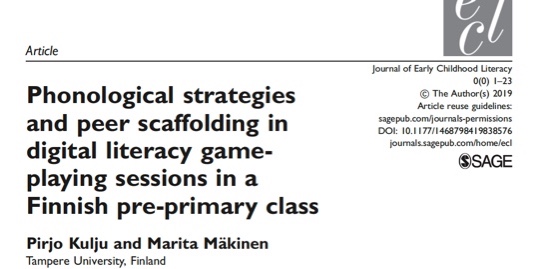Computer applications have been shown to support beginning readers and to be effective in training at-risk children. The benefits of using GraphoGame, an early literacy game, are also evident in the context of the Finnish language. However, we believe that the pedagogical aspect and potential of the digital reading apps remains untapped.
Instead of so called outcomes-orientated approach we focused on how a digital reading game can foster learning (process-orientated approach). Based on the concepts of peer scaffolding and languaging we investigated what kind of linguistic strategies pre-primary aged children use while playing a digital reading game Lolan tavuviidakko (Lola’s Syllable Jungle). We also looket at what kind of scaffolded learning situations can be detected.
The results showed that children’s linguistic strategies were related for example to word structure (whole word structure, syllables, phonemes), orthography (letter names) and to notions where children shifted their attention from forms to meanings by associations. Languaging was usually thinking aloud one’s own strategy. Based on the data it seems to be possible that a skilled 6-year-old is able to operate on the zone of proximal development of his/her peer. The results illustrate the pedagogical potential of digital literacy games in the context of social interaction and peer scaffolding.
Articles:
Kulju, P. & Mäkinen, M. (2019). Phonological strategies and peer scaffolding in digital literacy gameplaying sessions in a Finnish pre-primary class. Journal of Early Childhood Literacy. OnlineFirst. https://doi.org/10.1177/1468798419838576

